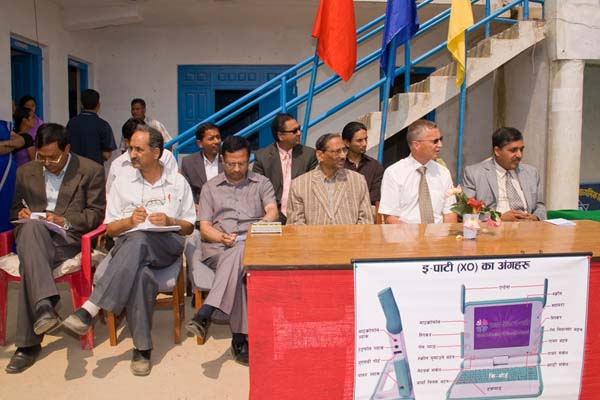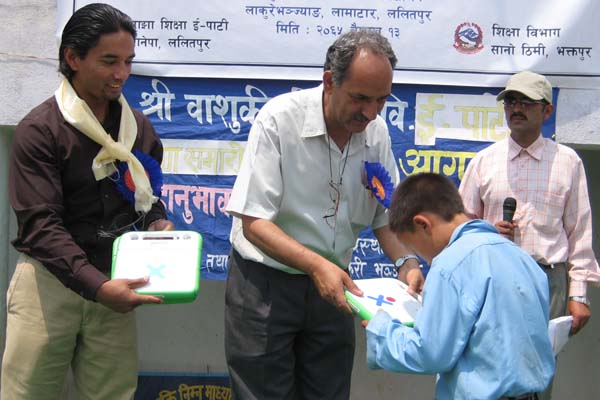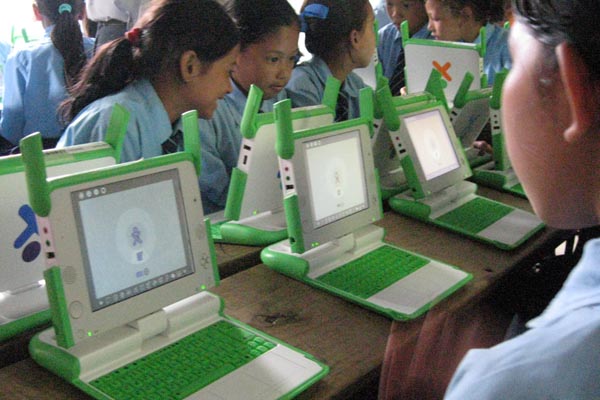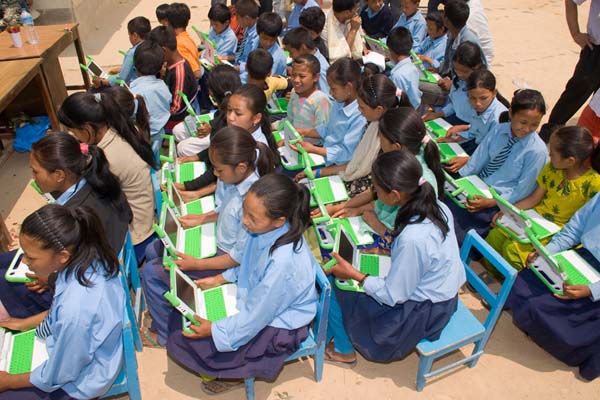OLE Nepal: Blog Announcements: Difference between revisions
No edit summary |
No edit summary |
||
| Line 77: | Line 77: | ||
The distribution program started in the morning at Bashuki Lower Secondary School in Lakuribhanjyang, Lamatar VDC in Lalitpur district. As guests made their way up the dusty gravel road leading up to the school, students, teachers, parents, and community members waited anxiously for the program to begin. OLE Nepal team was there ahead of others with the laptops, and was busy helping with the program setup. Guests were given a short tour of the school that highlighted the internal wireless network, the wireless radio network that connected the school to the DoE and OLE Nepal office, the power arrangements including the power racks, the school server, and the classrooms where seating was arranged to encourage interaction. |
The distribution program started in the morning at Bashuki Lower Secondary School in Lakuribhanjyang, Lamatar VDC in Lalitpur district. As guests made their way up the dusty gravel road leading up to the school, students, teachers, parents, and community members waited anxiously for the program to begin. OLE Nepal team was there ahead of others with the laptops, and was busy helping with the program setup. Guests were given a short tour of the school that highlighted the internal wireless network, the wireless radio network that connected the school to the DoE and OLE Nepal office, the power arrangements including the power racks, the school server, and the classrooms where seating was arranged to encourage interaction. |
||
[Image:bsh-guests.jpg|Special Guests at Bashuki] |
[[Image:bsh-guests.jpg|Special Guests at Bashuki]] |
||
The Chief Guest of the program was the Secretary of Ministry of Education and Sports Mr. Balananda Poudel. The secretary is the highest level civil servant in the ministry. Other special guests included Executive Director of Curriculum Development Center Mr. Haribol Khanal, Executive Director of National Center for Education Development Mr. Ram Swaroop Sinha, Director of DoE, Mr. Mahashram Sharma, Chief District Education Officer Mr. Babu Kaji Karki, Lalitpur Minister Counselor of the Danish Embassy Mr. Ove Larsen, Chairperson of the OLE Nepal Board of Directors Dr. Prativa Pandey. The program was widely covered by journalists from major media outlets including print and TV. |
The Chief Guest of the program was the Secretary of Ministry of Education and Sports Mr. Balananda Poudel. The secretary is the highest level civil servant in the ministry. Other special guests included Executive Director of Curriculum Development Center Mr. Haribol Khanal, Executive Director of National Center for Education Development Mr. Ram Swaroop Sinha, Director of DoE, Mr. Mahashram Sharma, Chief District Education Officer Mr. Babu Kaji Karki, Lalitpur Minister Counselor of the Danish Embassy Mr. Ove Larsen, Chairperson of the OLE Nepal Board of Directors Dr. Prativa Pandey. The program was widely covered by journalists from major media outlets including print and TV. |
||
[Image:bsh-laptop-handing.jpg|Special Guests at Bashuki] |
[[Image:bsh-laptop-handing.jpg|Special Guests at Bashuki]] |
||
After the welcome speech and few words by the special guests, we proceeded to hand out laptops to the 75 lucky students. The kids were quite excited when they were handed the laptops. They immediately went back to their seats and opened the laptops, and with the help of OLE Nepal team members, they started checking out the activities that were in the laptops. While journalists, photographers, and cameramen were busy capturing the moment, the students were already showing off what they had discovered to their friends. It was quite interesting to see how they handled the laptops with care, and it was obvious that they greatly valued their newly received education tool. |
After the welcome speech and few words by the special guests, we proceeded to hand out laptops to the 75 lucky students. The kids were quite excited when they were handed the laptops. They immediately went back to their seats and opened the laptops, and with the help of OLE Nepal team members, they started checking out the activities that were in the laptops. While journalists, photographers, and cameramen were busy capturing the moment, the students were already showing off what they had discovered to their friends. It was quite interesting to see how they handled the laptops with care, and it was obvious that they greatly valued their newly received education tool. |
||
[Image:bsw-class-6-close.jpg|Special Guests at Bashuki] |
[[Image:bsw-class-6-close.jpg|Special Guests at Bashuki]] |
||
After few photo ops we headed to the next school, Bishwamitra Ganesh Lower Secondary School in Jyamirkot, Lubhu VDC, Lalitpur. After a brief stop for lunch at the bottom of the hill, we arrived at our destination where the teachers offered us a warm welcome with garlands and flowers. At this school, we handed out 60 laptops to the students. The reactions from the students were similar to that of the Bashuki. |
After few photo ops we headed to the next school, Bishwamitra Ganesh Lower Secondary School in Jyamirkot, Lubhu VDC, Lalitpur. After a brief stop for lunch at the bottom of the hill, we arrived at our destination where the teachers offered us a warm welcome with garlands and flowers. At this school, we handed out 60 laptops to the students. The reactions from the students were similar to that of the Bashuki. |
||
[Image:bsh-outside.jpg|Special Guests at Bashuki] |
[[Image:bsh-outside.jpg|Special Guests at Bashuki]] |
||
After the long and arduous day, we trudged back to our office in the evening with a great sense of accomplishment, but knowing too well that our real work had just begun. A lot of questions still loom in our minds. How will the children take care of the laptops? Will the network be able to handle the traffic when 70 children try to access the Internet together? Will the laptops have hardware problems? Will the teachers be able to successfully integrate the new teaching method in daily teaching? This is, after all, the test phase of the project, where OLE Nepal, along with the Department of Education hopes to find answers to the questions surrounding challenges in implementation. The plan is to use the findings to prepare a scalable model that can be replicated when we expand to schools in other districts. |
After the long and arduous day, we trudged back to our office in the evening with a great sense of accomplishment, but knowing too well that our real work had just begun. A lot of questions still loom in our minds. How will the children take care of the laptops? Will the network be able to handle the traffic when 70 children try to access the Internet together? Will the laptops have hardware problems? Will the teachers be able to successfully integrate the new teaching method in daily teaching? This is, after all, the test phase of the project, where OLE Nepal, along with the Department of Education hopes to find answers to the questions surrounding challenges in implementation. The plan is to use the findings to prepare a scalable model that can be replicated when we expand to schools in other districts. |
||
[Image:bsh-grp.jpg|Special Guests at Bashuki] |
[[Image:bsh-grp.jpg|Special Guests at Bashuki]] |
||
The laptops have finally reached their destination. They have come a long way, and was made possible only through the contribution and hard work of many individuals and organizations. One Laptop Per Child has to be credited for defying the critics and coming up with this amazing piece of machine that we believe will transform education around the world. We owe our gratitude to the Danish IT Society for providing the laptops for Nepal’s test phase. We hope that with a successful implementation of this phase, we can expect similar support in the future phases. Special thanks go to Dr. Richard Rowe and his team at OLE Inc in Cambridge, USA, for the constant support and guidance, the Danish Embassy in Kathmandu for supporting the project, and Corelatus, Sweden, for providing the funds to network the schools. We would also like to thank Mr. John Cook and Mr. Peter Dalglish for their constant advice and support. We cannot end without mentioning that we have been blessed with a dynamic group of individuals that comprise our Board of Directors. |
The laptops have finally reached their destination. They have come a long way, and was made possible only through the contribution and hard work of many individuals and organizations. One Laptop Per Child has to be credited for defying the critics and coming up with this amazing piece of machine that we believe will transform education around the world. We owe our gratitude to the Danish IT Society for providing the laptops for Nepal’s test phase. We hope that with a successful implementation of this phase, we can expect similar support in the future phases. Special thanks go to Dr. Richard Rowe and his team at OLE Inc in Cambridge, USA, for the constant support and guidance, the Danish Embassy in Kathmandu for supporting the project, and Corelatus, Sweden, for providing the funds to network the schools. We would also like to thank Mr. John Cook and Mr. Peter Dalglish for their constant advice and support. We cannot end without mentioning that we have been blessed with a dynamic group of individuals that comprise our Board of Directors. |
||
Revision as of 05:38, 22 May 2008
Announcements
Second OLPC Game Jam
Second OLPC Game Jam January 30th, 2008 By: Om Yadav
We are going to hold our second ‘OLPC Game Jam’ on 9th February 2008. We are expecting to see quite a few participants from our first jam and new participants too. Please spread the word and sign up on our discussion forum to participate in the discussion and share your ideas.
ACE Institute of Management has generously provided us their computer lab for the event. Special thanks to Ms Prabina Rajbhandari, Mr Jayanta Pokharel, Ms Nirvika Prakash and Mr Bishnu Dhakal for their help and support.
We have a limited number of seats and want to make sure that every participant gets their own machine to develop their activity. If you are interested in participating reserve a seat by sending an email to register@olenepal.org.
We're Looking for a Super SysAdmin
We’re Looking for a Super SysAdmin March 4th, 2008 By:Sulochan Acharya
The Problem
Over the course of 2008, OLE Nepal will implement OLPC at a number of schools in Nepal. Some important technical aspects of deployment are the updating the XO’s, back up of student data, maintaining mesh network, and web caching. Much work remains to be done in the general area of the School Server. The School Server is currently under active development and will likely be so throughout 2008. OLPC recently made a great decision in hiring Martin Langhoff to serve as the School Server Architect. Here in Nepal, we need a rockin’ sysadmin that can work with our Kathmandu-based team and with OLPC to implement a school server solution that meets the needs of kids and teachers in Nepal.
We need this person to can commit 5 months full-time here in Nepal. You need to be local because working remotely won’t expose you to the real requirements of schools in Nepal. This is a volunteer position. We operate on a shoestring and volunteers already do a good portion of our organization’s work.
Your Skills
You dream in Bash IPv4, IPv6, Wireless Mesh networking? No problem! You know linux networking inside and out Extensive knowledge of BIND, DHCPD, Squid, Apache, security, etc. Experience working with Moodle would be most excellent Adept with Python scripting or could learn it quickly. OLPC has standardized on Python for scripting You look to implement a practical solution that less skilled sysadmins can easily maintain over a cooler but more complicated solution. You play well with others. You don’t alienate collaborators with rude e-mails that assert your technical superiority (even though you are) Your primary concern is meeting the educational needs of kids and teachers. Your rate technical awesomeness a distant second to meeting those critical needs. What you Would Do
Work with our deployment team to set up and maintain School Servers, customized XO builds, and the Active Antenna Collaborate closely with Martin Langhoff and John Watlington of OLPC to enhance the mainline School Server distribution, move our local additions into the main distribution, and communicate Nepal’s requirements to OLPC Over the course of your stay, work to make the School Server as stable and easy to maintain as possible Document our configurations for our own reference and the use of other OLPC deployments Your immediate colleagues would be
Dev “Where’s the Party Yaar?” Mohanty, in charge of connecting the schools to the Internet
Sulochan Acharya (me), general troubleshooting of all technical problems at the schools
Bryan Berry, leads the deployment team, does planning, budgeting, and basic system administration among other duties
Who Should Not Apply
If you are looking for a vacation in an exotic locale, go to Thailand. We work hard, very hard. We have a lot of fun too.
You are only interested in OLPC’s technology and have little interest in its educational goals. As Nicholas Negroponte frequently repeats, this is an education project not a laptop project. If you are not genuinely interested in meeting the needs of kids and teachers, please do not apply. This is worth repeating. If you are not genuinely interested in meeting the needs of kids and teachers, please do not apply.
You are not able to commit to a 5-month stay in Nepal.
What we can offer you
A fantastic opportunity to work on a really important project. A chance to radically enhance the quality of education in Nepal. A contribution to a larger global initiative. I could go on forever . . .
Now, we would love to pay you but as mentioned earlier our operation runs on a financial shoestring. This is a volunteer position. We can put you up in the OLE Nepal house together with Ties, Dev, and Dev’s lovely lady friend Manisha. Living costs in Nepal are __quite__ low. You can consult our current volunteers Ties, Dev, and Bryan about their expenses.
The Outcome
You walk away from Nepal having implemented a turn-key school server solution that helps kids and teachers collaborate, discover important ideas, and create things that matter to them. Your work will be replicated across OLPC deployments.
If you are interested please send an e-mail to info@olenepal.org.
Laptop project formally launched
Laptop project formally launched April 28th, 2008 By:Rabi Karmacharya
On April 25, 2008, Open Learning Exchange Nepal (OLE Nepal) distributed a total of 135 OLPC laptops to grade 2 and 6 students from two schools in the outskirts of Kathmandu Valley. These were addition to the 22 laptops that were handed out to teachers from the schools during the teacher preparation program held a month ago. The laptop project was undertaken in partnership with Nepal government’s Department of Education (DoE). This project is part of OLE Nepal’s mission to increase quality of education while reducing current disparity in access and quality between school types, regions, and population groups by integrating ICT-based education in daily teaching-learning process. The laptops for the project were donated by the Danish IT Society in Copenhagen.
The distribution program started in the morning at Bashuki Lower Secondary School in Lakuribhanjyang, Lamatar VDC in Lalitpur district. As guests made their way up the dusty gravel road leading up to the school, students, teachers, parents, and community members waited anxiously for the program to begin. OLE Nepal team was there ahead of others with the laptops, and was busy helping with the program setup. Guests were given a short tour of the school that highlighted the internal wireless network, the wireless radio network that connected the school to the DoE and OLE Nepal office, the power arrangements including the power racks, the school server, and the classrooms where seating was arranged to encourage interaction.
The Chief Guest of the program was the Secretary of Ministry of Education and Sports Mr. Balananda Poudel. The secretary is the highest level civil servant in the ministry. Other special guests included Executive Director of Curriculum Development Center Mr. Haribol Khanal, Executive Director of National Center for Education Development Mr. Ram Swaroop Sinha, Director of DoE, Mr. Mahashram Sharma, Chief District Education Officer Mr. Babu Kaji Karki, Lalitpur Minister Counselor of the Danish Embassy Mr. Ove Larsen, Chairperson of the OLE Nepal Board of Directors Dr. Prativa Pandey. The program was widely covered by journalists from major media outlets including print and TV.
After the welcome speech and few words by the special guests, we proceeded to hand out laptops to the 75 lucky students. The kids were quite excited when they were handed the laptops. They immediately went back to their seats and opened the laptops, and with the help of OLE Nepal team members, they started checking out the activities that were in the laptops. While journalists, photographers, and cameramen were busy capturing the moment, the students were already showing off what they had discovered to their friends. It was quite interesting to see how they handled the laptops with care, and it was obvious that they greatly valued their newly received education tool.
After few photo ops we headed to the next school, Bishwamitra Ganesh Lower Secondary School in Jyamirkot, Lubhu VDC, Lalitpur. After a brief stop for lunch at the bottom of the hill, we arrived at our destination where the teachers offered us a warm welcome with garlands and flowers. At this school, we handed out 60 laptops to the students. The reactions from the students were similar to that of the Bashuki.
After the long and arduous day, we trudged back to our office in the evening with a great sense of accomplishment, but knowing too well that our real work had just begun. A lot of questions still loom in our minds. How will the children take care of the laptops? Will the network be able to handle the traffic when 70 children try to access the Internet together? Will the laptops have hardware problems? Will the teachers be able to successfully integrate the new teaching method in daily teaching? This is, after all, the test phase of the project, where OLE Nepal, along with the Department of Education hopes to find answers to the questions surrounding challenges in implementation. The plan is to use the findings to prepare a scalable model that can be replicated when we expand to schools in other districts.
The laptops have finally reached their destination. They have come a long way, and was made possible only through the contribution and hard work of many individuals and organizations. One Laptop Per Child has to be credited for defying the critics and coming up with this amazing piece of machine that we believe will transform education around the world. We owe our gratitude to the Danish IT Society for providing the laptops for Nepal’s test phase. We hope that with a successful implementation of this phase, we can expect similar support in the future phases. Special thanks go to Dr. Richard Rowe and his team at OLE Inc in Cambridge, USA, for the constant support and guidance, the Danish Embassy in Kathmandu for supporting the project, and Corelatus, Sweden, for providing the funds to network the schools. We would also like to thank Mr. John Cook and Mr. Peter Dalglish for their constant advice and support. We cannot end without mentioning that we have been blessed with a dynamic group of individuals that comprise our Board of Directors.
We have not cut any corner in our preparation building up to the deployment of the laptops. We put in a lot of effort in preparing the teachers in both schools, including the 4 day residential training program. We have paid close attention to each of the learning activities we have built. Our team put in endless hours preparing the laptops. We have spent a great deal of time setting up the wireless network. We built special power racks to charge the laptops with ease. We designed sturdy bags that have compartments for the laptops. But, we all know that there will always be unforeseen problems and challenges. With the dedication of our team and the cooperation from the schools and the communities, I am confident that we can tackle each challenge that we shall face, and move forward.
Rabi Karmacharya Executive Director



